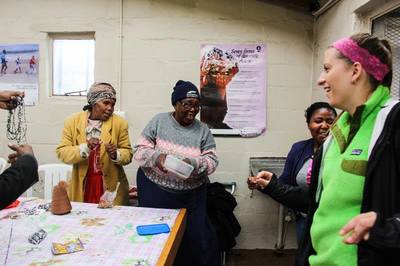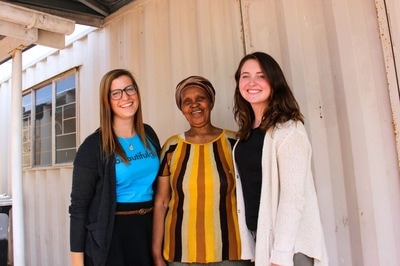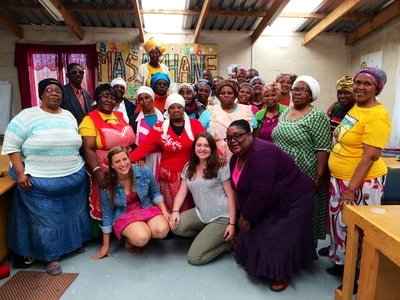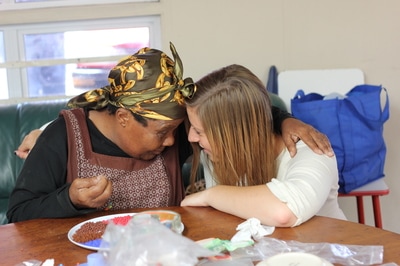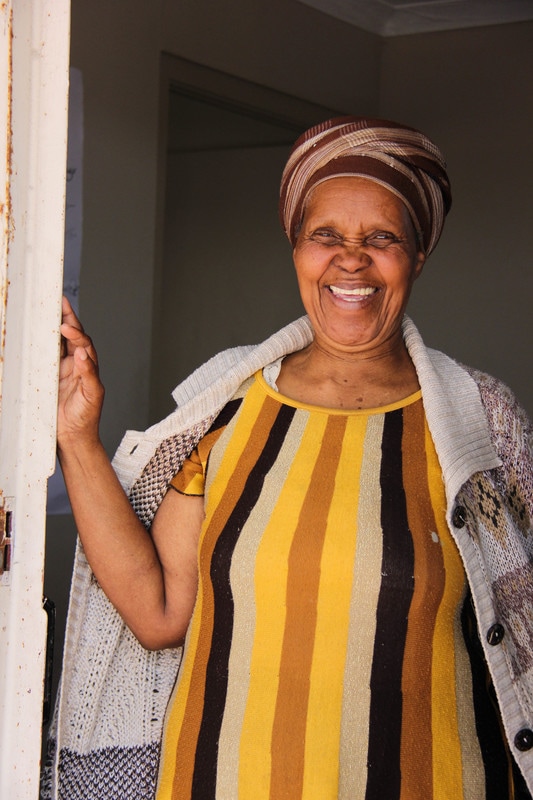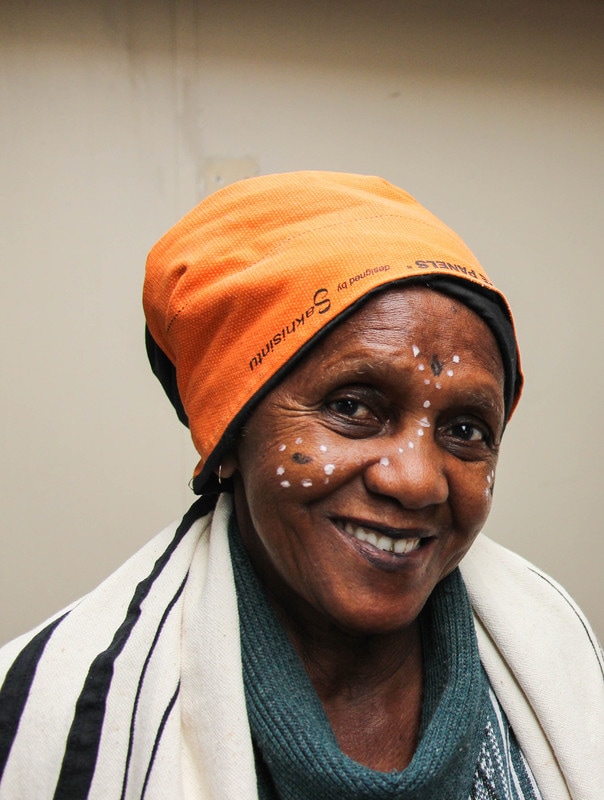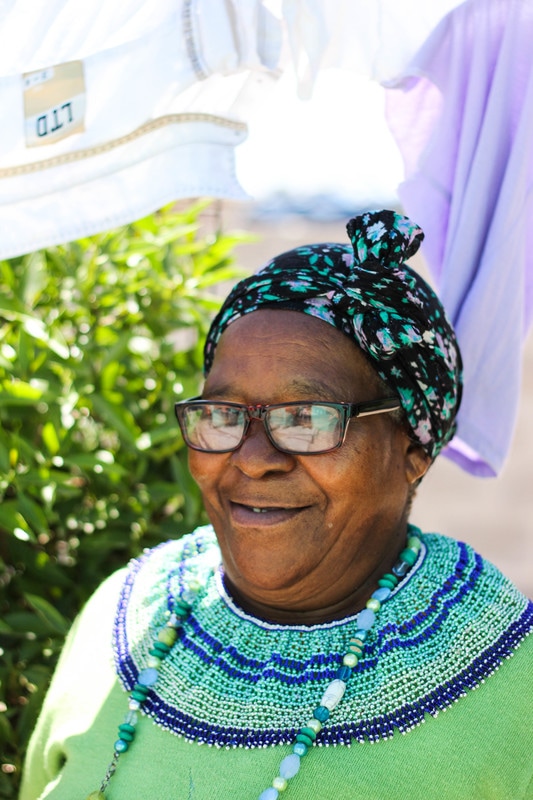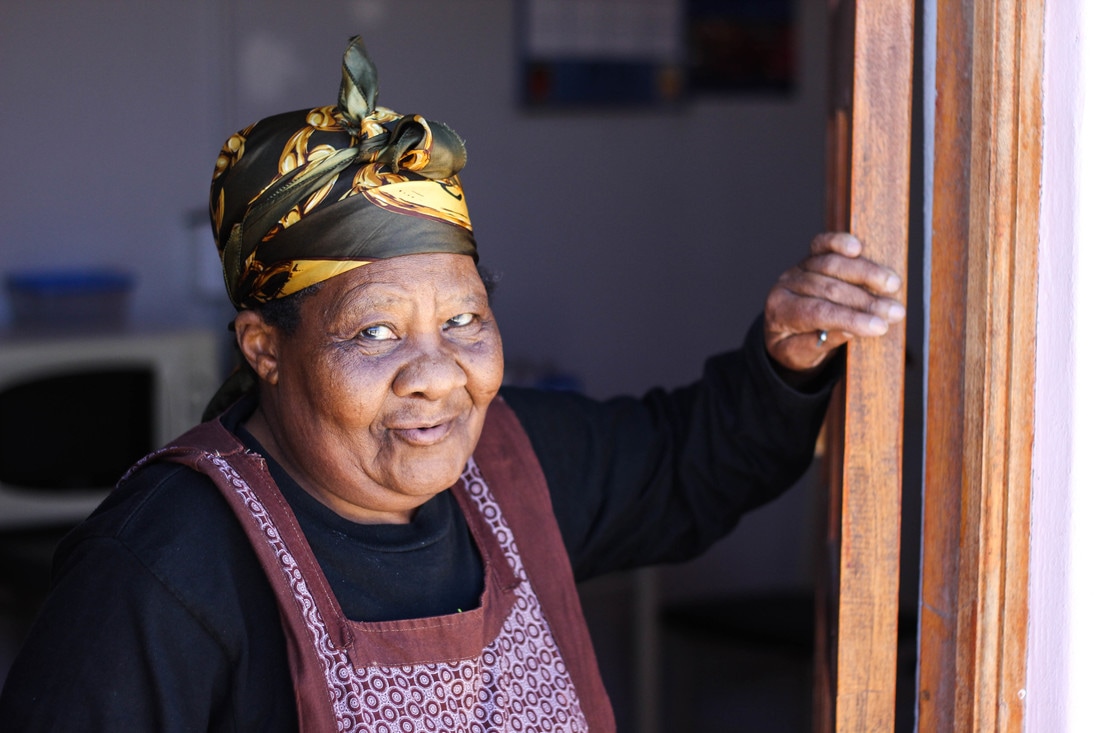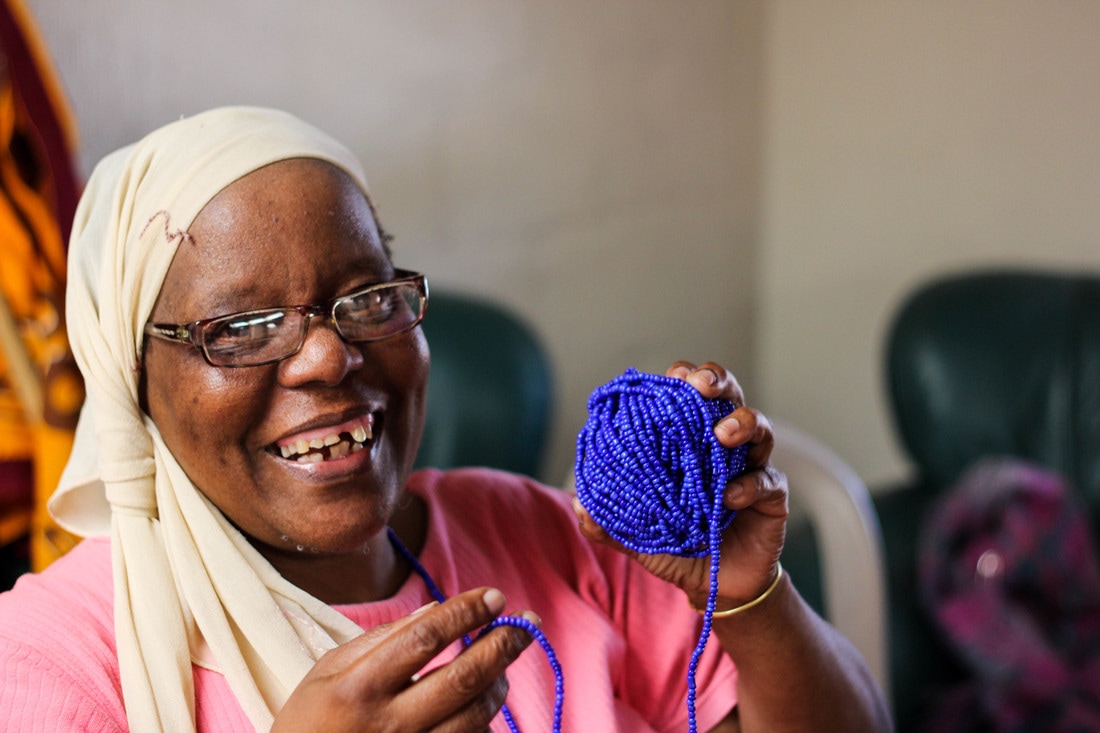The Mamas' History of Lower Crossroads
While studying abroad in Cape Town, South Africa, in the fall of 2014, I interned at the nonprofit community development agency Beautiful Gate and worked on a research project gathering oral histories from elderly members of the community where the agency is located. These narrative pieces were born as a result, telling the stories of how the township was formed as an informal settlement in the early 1990s and detailing several women's experiences under Apartheid. They are featured in an interactive exhibit at Beautiful Gate as well as part of a book manuscript that further details the history of the Lower Crossroads township.
Narratives by Allison Dikanovic; photography by Caitlin Courshon; interviews conducted by Allison Dikanovic and Caitlin Courshon with translation by Zanele Mzimba to be used by Beautiful Gate South Africa and the Lower Crossroads History Project. The following pieces were created and completed in the fall of 2014.
Narratives by Allison Dikanovic; photography by Caitlin Courshon; interviews conducted by Allison Dikanovic and Caitlin Courshon with translation by Zanele Mzimba to be used by Beautiful Gate South Africa and the Lower Crossroads History Project. The following pieces were created and completed in the fall of 2014.
Mama Iris Langisi: Fighting for a family life
“And we got free at last,” Mama Iris said with a tone of accomplishment and relief, as she gestured to her sea foam green house.
She was quick to add the caveat, “We got free at last, after a very, very difficult time of life.”
The house she has lived in for over 20 years now serves as a daily reminder of the comfort and stability that was not always hers. Due to her years as an activist during the Apartheid regime, Iris now speaks with the wearied wisdom of experience and an undertone of optimism that draws people in. Her smile is as warm as honey in a cup of rooibos tea.
Iris said her hopeful perspective was something she could control in the face of situations that were beyond her ability to change.
She was arranged to marry a man who worked in Cape Town and was not legally allowed to stay with him, because at the time, only working men were able to obtain passes to live in the city. This was just one way that the pervasive Apartheid policy interfered with Iris's family life--she was not even able to live in the same place as her husband.
“They didn’t want us to stay with our husbands. So then we fought for that… Because they were separating us. They said that we were supposed to go back to Eastern Cape and we were not allowed to live with them,” she said.
Iris said that keeping her family intact was the most important thing to her. She moved to Elsies River with her husband and daughter only to need to get up and move again because Elsies River was then designated for white people only. They settled in Modderdam, an informal squatter camp. Iris said she was used to the consistent message throughout this part of her life: You are not allowed here; you are not welcome here because of the color of your skin. She became accustomed to needing to hide from inspectors and police officers so her family could go on with their day to day lives as best as they could, as best as anyone could go on with their day when just being in your home or on the street was illegal.
“It was very difficult because as soon as you would hear the noise of the car, you would just [motions dropping to the floor]. Even if you were just eating and you heard [makes noise], you would just drop that food and run and hide yourself behind something.”
One day as Iris was walking to her husband’s work, she was not able to hide herself in enough time. She was stopped on the street by a police officer who asked to see her pass. When all she could show him was her ‘don’t pass,’ Iris was taken to the police station where she had to stay the night.
“Then on the following day, I went to Langa court. They said to me, ‘We find you guilty because you are not allowed to be here.’”
Her husband came to her hearing and paid Iris’s bail. Without it, she would have needed to spend three months in jail. But even after she was released from jail, Iris said that she still didn’t feel free at all. With police officers searching squatter camps regularly, even waiting in buses, Iris and the thousands of other women sharing her circumstances during these years needed to constantly live on high alert. These women carried on their lives with all forces pressing against them. In addition to excessively arresting non-white people, the police physically chased Iris and others with tear gas to push them out of these areas.
“They were chasing us saying we must go back to the Eastern Cape," she said. "They were always chasing us.”
After years of being chased and abused, Iris found her home in Lower Crossroads, the community that she helped raise from the ground up. She beams with pride when she talks about her home now and the better life that she has witnessed her children live because of the sacrifices she has made. After fighting and marching for years in the women’s league, she knows she played a part in creating that better life.
“And we got free at last,” Mama Iris said with a tone of accomplishment and relief, as she gestured to her sea foam green house.
She was quick to add the caveat, “We got free at last, after a very, very difficult time of life.”
The house she has lived in for over 20 years now serves as a daily reminder of the comfort and stability that was not always hers. Due to her years as an activist during the Apartheid regime, Iris now speaks with the wearied wisdom of experience and an undertone of optimism that draws people in. Her smile is as warm as honey in a cup of rooibos tea.
Iris said her hopeful perspective was something she could control in the face of situations that were beyond her ability to change.
She was arranged to marry a man who worked in Cape Town and was not legally allowed to stay with him, because at the time, only working men were able to obtain passes to live in the city. This was just one way that the pervasive Apartheid policy interfered with Iris's family life--she was not even able to live in the same place as her husband.
“They didn’t want us to stay with our husbands. So then we fought for that… Because they were separating us. They said that we were supposed to go back to Eastern Cape and we were not allowed to live with them,” she said.
Iris said that keeping her family intact was the most important thing to her. She moved to Elsies River with her husband and daughter only to need to get up and move again because Elsies River was then designated for white people only. They settled in Modderdam, an informal squatter camp. Iris said she was used to the consistent message throughout this part of her life: You are not allowed here; you are not welcome here because of the color of your skin. She became accustomed to needing to hide from inspectors and police officers so her family could go on with their day to day lives as best as they could, as best as anyone could go on with their day when just being in your home or on the street was illegal.
“It was very difficult because as soon as you would hear the noise of the car, you would just [motions dropping to the floor]. Even if you were just eating and you heard [makes noise], you would just drop that food and run and hide yourself behind something.”
One day as Iris was walking to her husband’s work, she was not able to hide herself in enough time. She was stopped on the street by a police officer who asked to see her pass. When all she could show him was her ‘don’t pass,’ Iris was taken to the police station where she had to stay the night.
“Then on the following day, I went to Langa court. They said to me, ‘We find you guilty because you are not allowed to be here.’”
Her husband came to her hearing and paid Iris’s bail. Without it, she would have needed to spend three months in jail. But even after she was released from jail, Iris said that she still didn’t feel free at all. With police officers searching squatter camps regularly, even waiting in buses, Iris and the thousands of other women sharing her circumstances during these years needed to constantly live on high alert. These women carried on their lives with all forces pressing against them. In addition to excessively arresting non-white people, the police physically chased Iris and others with tear gas to push them out of these areas.
“They were chasing us saying we must go back to the Eastern Cape," she said. "They were always chasing us.”
After years of being chased and abused, Iris found her home in Lower Crossroads, the community that she helped raise from the ground up. She beams with pride when she talks about her home now and the better life that she has witnessed her children live because of the sacrifices she has made. After fighting and marching for years in the women’s league, she knows she played a part in creating that better life.
Mama Nombeko: Building Crossroads
“We built Crossroads," Nombeko said. "We built this place with our own hands."
Nombeko is a pioneer of this community. She is a bold woman with a sassy smirk who is still in love with the man she married over 47 years ago. Her laugh can shift the energy in an entire room, and she is just as generous with a compliment as she is with a quick-witted insult.
Nombeko emanates a feeling of home, something that she was deprived of for most of her life. She speaks with the confidence of a life well lived.
She reflected that perhaps one of her biggest accomplishments was being a part of the first group of people who established the community of Crossroads, becoming the first area of South Africa to receive a government permit to build shacks. Nombeko moved to Crossroads with her husband in 1973 after leaving an all-male hostel in Langa that she said was unfit for a woman and family to live.
Moving was not a new concept to Nombeko, who had been forced to move five different times throughout her life. Born in Transkei, she moved with her parents to Cape Town as a child and considers the city her home. Her family was forcibly removed from their house because of the Group Areas Act and resulting pass laws. Retreat was deemed a whites only area, and from a young age, Nombeko knew this was wrong and was prepared to do something about it.
“They said we are not supposed to be here in South Africa—but we are South Africans, and we were not allowed to be here,” she said.
Even when Nombeko moved her family to Crossroads, it was not by her own choice. After being arrested in Langa because of her ‘don’t pass,’ Nombeko, her husband, and crowds of others were taken from the Langa Police Department, put on a train, and shipped to the Eastern Cape. But Nombeko was always ready to fight in the name of her rights, and it would take much more than a train on its way to the ‘homelands’ to stop her. Actually, she laughed and sang in the face of such an idea.
“Oh no we just, we were singing on the train, singing, and when we were in Queenstown… we were saying it’s alright… We just took another ticket back to Cape Town,” she said.
When arriving back to the Western Cape, Nombeko knew that she could no longer return home to Langa. Her husband and other members of their community joined her and set out to build a new home in an area known as Crossroads. The area showed no signs of life, much less infrastructure, but Nombeko and her friends were not ready to give up on their families’ lives in Cape Town.
“We came back to our forest, to Crossroads," she said. "We were the first ones.”
In the early phases of community life in Crossroads, Nombeko and others built shacks out of plastic and metal scraps among the trees to cover themselves to sleep at night. These temporary homes had to be taken down every morning because the police would come to Crossroads searching for illegal squatters. Every night the community would have to rebuild their shelters so their families could live together, and this was the closest thing Nombeko had to a home for nearly three years. When asked what it was like to experience the early stages of Crossroads and needing to hide from the police every day until they received their permits to settle there, Nombeko responded:
“It was nice at that time… Yeah. Oh, very nice. Because we didn’t kill even a person… but we were fighting for our rights,” she said.
Being uprooted from her home and moving to an informal settlement did not make Nombeko bitter, but it did make her realize the extent of the injustice and oppression inflicted upon her by the Apartheid government. Leaders like Nombeko who worked peacefully for basic human rights, persevered through abhorrent circumstances, and showed as much passion for the improvement of their community as they did for the preservation of their families, are the ones who founded and shaped Crossroads in its earliest years. Remembering the work that she put in for the sake of a better future for her family is what gives Mama Nombeko that confident glow in her eye to this day.
“We built Crossroads," Nombeko said. "We built this place with our own hands."
Nombeko is a pioneer of this community. She is a bold woman with a sassy smirk who is still in love with the man she married over 47 years ago. Her laugh can shift the energy in an entire room, and she is just as generous with a compliment as she is with a quick-witted insult.
Nombeko emanates a feeling of home, something that she was deprived of for most of her life. She speaks with the confidence of a life well lived.
She reflected that perhaps one of her biggest accomplishments was being a part of the first group of people who established the community of Crossroads, becoming the first area of South Africa to receive a government permit to build shacks. Nombeko moved to Crossroads with her husband in 1973 after leaving an all-male hostel in Langa that she said was unfit for a woman and family to live.
Moving was not a new concept to Nombeko, who had been forced to move five different times throughout her life. Born in Transkei, she moved with her parents to Cape Town as a child and considers the city her home. Her family was forcibly removed from their house because of the Group Areas Act and resulting pass laws. Retreat was deemed a whites only area, and from a young age, Nombeko knew this was wrong and was prepared to do something about it.
“They said we are not supposed to be here in South Africa—but we are South Africans, and we were not allowed to be here,” she said.
Even when Nombeko moved her family to Crossroads, it was not by her own choice. After being arrested in Langa because of her ‘don’t pass,’ Nombeko, her husband, and crowds of others were taken from the Langa Police Department, put on a train, and shipped to the Eastern Cape. But Nombeko was always ready to fight in the name of her rights, and it would take much more than a train on its way to the ‘homelands’ to stop her. Actually, she laughed and sang in the face of such an idea.
“Oh no we just, we were singing on the train, singing, and when we were in Queenstown… we were saying it’s alright… We just took another ticket back to Cape Town,” she said.
When arriving back to the Western Cape, Nombeko knew that she could no longer return home to Langa. Her husband and other members of their community joined her and set out to build a new home in an area known as Crossroads. The area showed no signs of life, much less infrastructure, but Nombeko and her friends were not ready to give up on their families’ lives in Cape Town.
“We came back to our forest, to Crossroads," she said. "We were the first ones.”
In the early phases of community life in Crossroads, Nombeko and others built shacks out of plastic and metal scraps among the trees to cover themselves to sleep at night. These temporary homes had to be taken down every morning because the police would come to Crossroads searching for illegal squatters. Every night the community would have to rebuild their shelters so their families could live together, and this was the closest thing Nombeko had to a home for nearly three years. When asked what it was like to experience the early stages of Crossroads and needing to hide from the police every day until they received their permits to settle there, Nombeko responded:
“It was nice at that time… Yeah. Oh, very nice. Because we didn’t kill even a person… but we were fighting for our rights,” she said.
Being uprooted from her home and moving to an informal settlement did not make Nombeko bitter, but it did make her realize the extent of the injustice and oppression inflicted upon her by the Apartheid government. Leaders like Nombeko who worked peacefully for basic human rights, persevered through abhorrent circumstances, and showed as much passion for the improvement of their community as they did for the preservation of their families, are the ones who founded and shaped Crossroads in its earliest years. Remembering the work that she put in for the sake of a better future for her family is what gives Mama Nombeko that confident glow in her eye to this day.
Mama Vinah: The evictions
“Bebechitha izindlu bazifkhe emgqomeni,” Vinah said. (They dismantled our houses, and they put them in the waste bin.)
As someone who has had her property, home, and everything in between taken from her, Mama Vinah never lost sight of her self-worth. She has an understated dignity about her that does not need to be announced. It shows through her warm expressions, friendly handshakes, adorable chuckles, and quiet disposition. When you walk into the room, Vinah may not be the first person you notice as she holds small conversations with those in closest proximity while knitting an intricate scarf.
It was in 1994 that Vinah and her family were evicted from Old Crossroads, but what happened would be better described as a forced removal than an eviction. Inspectors showed up to Vinah’s house, knocked on her door, and aggressively instructed her that her four children, her husband, and she needed to move out from their home that same day. This was often the case with these types of forced removals. Families would be expected to leave on command and would not receive even a day’s notice. The inspectors would destroy furniture and nearly all of the belongings of the homes they demolished. Mama Vinah does not even have her ‘don’t pass’ card to remember that time in her life because the inspectors destroyed it.
Vinah knew that day was coming when she would need to leave Old Crossroads, as she had been living in hiding from the moment she moved there, always aware that she could be arrested yet again. The idea of being forced from her home was a repetitive pattern in the course of her life. Before she fled to Old Crossroads, Vinah and her husband were forced out of their home in Steinberg. She knew how brutal the inspectors could be, which is why she described her life in Crossroads by saying:
“Sasingahlalanga kamandi sasisoyika ngalonke ixesha,” she said. (We lived in fear. We did not live peacefully.)
This constant sense of fear arose from the exploitation and violation that Vinah experienced as strangers invaded and uprooted her life without regard to her family. Although no one else seemed to understand that she had a family to take care of, her husband and her children were Vinah’s primary motivation for remaining in Cape Town throughout such tumultuous situations. She believed that in order for her children to thrive and her family to be the healthiest it could be, they all needed to stick together. She explains why she persevered through the struggle for family life from Old Crossroads to Lower Crossroads by saying,
“Ndiandi khusela abantwana baimi nemtanelo zam," she said. (I was protecting my children and what belonged to me. As a wife, I was taking care of my home and protecting and providing what a wife should for her family.)
Supporting her family is still Vinah’s biggest priority. After experiencing the brutality of forced removal after forced removal, she has resided in her home in Lower Crossroads for 20 years, along with all seven of her wonderful grandchildren. A natural mother, Mama Vinah is one of the founding caregivers of her community that she can finally proudly and permanently call home.
“Bebechitha izindlu bazifkhe emgqomeni,” Vinah said. (They dismantled our houses, and they put them in the waste bin.)
As someone who has had her property, home, and everything in between taken from her, Mama Vinah never lost sight of her self-worth. She has an understated dignity about her that does not need to be announced. It shows through her warm expressions, friendly handshakes, adorable chuckles, and quiet disposition. When you walk into the room, Vinah may not be the first person you notice as she holds small conversations with those in closest proximity while knitting an intricate scarf.
It was in 1994 that Vinah and her family were evicted from Old Crossroads, but what happened would be better described as a forced removal than an eviction. Inspectors showed up to Vinah’s house, knocked on her door, and aggressively instructed her that her four children, her husband, and she needed to move out from their home that same day. This was often the case with these types of forced removals. Families would be expected to leave on command and would not receive even a day’s notice. The inspectors would destroy furniture and nearly all of the belongings of the homes they demolished. Mama Vinah does not even have her ‘don’t pass’ card to remember that time in her life because the inspectors destroyed it.
Vinah knew that day was coming when she would need to leave Old Crossroads, as she had been living in hiding from the moment she moved there, always aware that she could be arrested yet again. The idea of being forced from her home was a repetitive pattern in the course of her life. Before she fled to Old Crossroads, Vinah and her husband were forced out of their home in Steinberg. She knew how brutal the inspectors could be, which is why she described her life in Crossroads by saying:
“Sasingahlalanga kamandi sasisoyika ngalonke ixesha,” she said. (We lived in fear. We did not live peacefully.)
This constant sense of fear arose from the exploitation and violation that Vinah experienced as strangers invaded and uprooted her life without regard to her family. Although no one else seemed to understand that she had a family to take care of, her husband and her children were Vinah’s primary motivation for remaining in Cape Town throughout such tumultuous situations. She believed that in order for her children to thrive and her family to be the healthiest it could be, they all needed to stick together. She explains why she persevered through the struggle for family life from Old Crossroads to Lower Crossroads by saying,
“Ndiandi khusela abantwana baimi nemtanelo zam," she said. (I was protecting my children and what belonged to me. As a wife, I was taking care of my home and protecting and providing what a wife should for her family.)
Supporting her family is still Vinah’s biggest priority. After experiencing the brutality of forced removal after forced removal, she has resided in her home in Lower Crossroads for 20 years, along with all seven of her wonderful grandchildren. A natural mother, Mama Vinah is one of the founding caregivers of her community that she can finally proudly and permanently call home.
Mama Nosabatha Xhekesha: The riots
“We didn’t know who was burning the houses," Nosabatha said. "We just saw fire. They burned them at night.”
Nosabatha, who can often be found either horizontal on the couch with her feet in the air laughing her signature cackle laugh at the last story shared, making a goofy face to spark a smile, or hunched over the round table making her next move in a competitive round of shoots and ladders, spoke these words with terror in her eyes and a slowness of voice. She was proud to share about her history in the struggle as she comfortably maintained her perch in the outside room where she could keep her eye on all the happenings of those around her, but it was the moment when she began to speak specifically of the violence and the riots of Old Crossroads that her eyes lowered and her head started to shake slowly.
Nosabatha had endured the ugliest days of life in Old Crossroads, remaining in the community well after most people had already fled to Khayelitsha, Lower Crossroads, or another surrounding area. She witnessed indiscriminate attacks on innocent families when the homes that they had fought to call their own were regularly, mercilessly burnt down overnight. The woman with the loud, joyful, raspy voice and all of the giggles grew more timid and heavy as she revealed how scary it was to live in the midst of such chaos.
“At that time, staying in Old Crossroads was not nice because we were getting scared because while we were sleeping we would hear people shooting outside and other people burning houses,” she said.
“Kwakunge mnandanga uhlala Old Crossroads kuba babesonqika kuba noba belele ebusuku babesiva abantu bekhwaza besilwa abanye beshiselwa izindlu.”
Political objectives within the community conflicts were ambiguous and sometimes even absent. Leaders wanted people to stay in Old Crossroads, others wanted people to leave, and in most situations the people affected by the fallout of the tangible tension that made up Old Crossroads did not even know who was attacking them or why. The hurting was senseless and pervasive, taking its toll even on Nosabatha, who was caught in crossfire as she was preparing to flee. One minute, Nosabatha was packing her remaining belongings into boxes and cleaning up around her home, and the next minute a bullet grazed under her chin.
“I didn’t see where the bullet was coming from," she said. "I just got shot. I don’t know who shot me.”
“Noba yayisukaphi lmbhumbhulu akazazi wandutyulwa ngobani.”
Being shot in the neck served as a final confirmation that she needed to get out of Old Crossroads, but Nosabatha had been planning to leave long before that as she could no longer stand to watch the riots cause harm to her family. Nosabatha’s husband had gotten very sick and had lost his mobility. She knew that if their house ever caught flame, intentionally or not, he would not be able to escape. After sticking with him for the majority of her life, moving to Cape Town to be with him, living in a hostel in Langa, moving to Freepoint, being forced out of Freepoint, and settling in Old Crossroads, there was no way she was going to give up on her family now. Nosabatha wanted to move her husband to a safer environment to make yet another home.
The riots in Old Crossroads did not only destroy homes and families, but they affected the quality of education for the community’s children. Nosabatha felt that her four children were not receiving a good education, and she also feared for their safety every single day. It was for these reasons that she felt she had to send her children back to the Eastern Cape to go to school. Being away from them was hard on her, so her move to Lower Crossroads was also in the hope that her family could eventually and finally be reunited when it became safe for her children to move back home.
From the moment you meet Nosabatha, you can see that she is a protector and a caregiver from the way that she calls everybody, “love,” to the way that she keeps tabs on what’s going on around her. What you don’t realize is the way that she has had to be a force of protection throughout her whole life. She now stays in a light pink house in Lower Crossroads and explained that the paint choice color means ‘new love’ as a symbol of her new home in the community. Mama Nosabatha has lived by herself since her husband passed, but her family visits often. Three of her children finished school, and one is now a nurse, carrying on her mother’s legacy of caring for others. When she mentions any of her children or grandchildren, Nosabatha can’t help but laugh. Her laughter threads its way through her days like the string through the beads of the bracelets she makes.
“We didn’t know who was burning the houses," Nosabatha said. "We just saw fire. They burned them at night.”
Nosabatha, who can often be found either horizontal on the couch with her feet in the air laughing her signature cackle laugh at the last story shared, making a goofy face to spark a smile, or hunched over the round table making her next move in a competitive round of shoots and ladders, spoke these words with terror in her eyes and a slowness of voice. She was proud to share about her history in the struggle as she comfortably maintained her perch in the outside room where she could keep her eye on all the happenings of those around her, but it was the moment when she began to speak specifically of the violence and the riots of Old Crossroads that her eyes lowered and her head started to shake slowly.
Nosabatha had endured the ugliest days of life in Old Crossroads, remaining in the community well after most people had already fled to Khayelitsha, Lower Crossroads, or another surrounding area. She witnessed indiscriminate attacks on innocent families when the homes that they had fought to call their own were regularly, mercilessly burnt down overnight. The woman with the loud, joyful, raspy voice and all of the giggles grew more timid and heavy as she revealed how scary it was to live in the midst of such chaos.
“At that time, staying in Old Crossroads was not nice because we were getting scared because while we were sleeping we would hear people shooting outside and other people burning houses,” she said.
“Kwakunge mnandanga uhlala Old Crossroads kuba babesonqika kuba noba belele ebusuku babesiva abantu bekhwaza besilwa abanye beshiselwa izindlu.”
Political objectives within the community conflicts were ambiguous and sometimes even absent. Leaders wanted people to stay in Old Crossroads, others wanted people to leave, and in most situations the people affected by the fallout of the tangible tension that made up Old Crossroads did not even know who was attacking them or why. The hurting was senseless and pervasive, taking its toll even on Nosabatha, who was caught in crossfire as she was preparing to flee. One minute, Nosabatha was packing her remaining belongings into boxes and cleaning up around her home, and the next minute a bullet grazed under her chin.
“I didn’t see where the bullet was coming from," she said. "I just got shot. I don’t know who shot me.”
“Noba yayisukaphi lmbhumbhulu akazazi wandutyulwa ngobani.”
Being shot in the neck served as a final confirmation that she needed to get out of Old Crossroads, but Nosabatha had been planning to leave long before that as she could no longer stand to watch the riots cause harm to her family. Nosabatha’s husband had gotten very sick and had lost his mobility. She knew that if their house ever caught flame, intentionally or not, he would not be able to escape. After sticking with him for the majority of her life, moving to Cape Town to be with him, living in a hostel in Langa, moving to Freepoint, being forced out of Freepoint, and settling in Old Crossroads, there was no way she was going to give up on her family now. Nosabatha wanted to move her husband to a safer environment to make yet another home.
The riots in Old Crossroads did not only destroy homes and families, but they affected the quality of education for the community’s children. Nosabatha felt that her four children were not receiving a good education, and she also feared for their safety every single day. It was for these reasons that she felt she had to send her children back to the Eastern Cape to go to school. Being away from them was hard on her, so her move to Lower Crossroads was also in the hope that her family could eventually and finally be reunited when it became safe for her children to move back home.
From the moment you meet Nosabatha, you can see that she is a protector and a caregiver from the way that she calls everybody, “love,” to the way that she keeps tabs on what’s going on around her. What you don’t realize is the way that she has had to be a force of protection throughout her whole life. She now stays in a light pink house in Lower Crossroads and explained that the paint choice color means ‘new love’ as a symbol of her new home in the community. Mama Nosabatha has lived by herself since her husband passed, but her family visits often. Three of her children finished school, and one is now a nurse, carrying on her mother’s legacy of caring for others. When she mentions any of her children or grandchildren, Nosabatha can’t help but laugh. Her laughter threads its way through her days like the string through the beads of the bracelets she makes.
Mama Agnes: The birth of Lower Crossroads
“On the first day we slept outside because we didn’t have a chance to build the houses.” When Mama Agnes and her three children arrived to Lower Crossroads in 1992 with the first group of squatters forced out of Old Crossroads, the area was literally an undeveloped forest. She laughs as she recounts the day when, “a lot of people,” moved with her and had to spend the night unprotected under the Cape Town stars. This is typical of Agnes, who covers up the weariness that becomes visible when you learn more about her life with a casual, hearty belly laugh. Agnes generally minds her own business and is extremely talented with crafting, beading, and weaving potholders. She has the tough appearance but tender nature that is characteristic of single parents, as she raised all three of her children by herself.
As the primary breadwinner for her family, Agnes knew that she needed to move out of the Eastern Cape if she wanted to be able to find enough work to provide for and feed her children. These circumstances brought her to Cape Town in 1976 despite the fact that her ‘don’t pass’ prevented her from legally moving into the city. In the face of such trying policy, by 1980 Agnes had found herself needing to hide out in Old Crossroads. Within that next decade, the political situation only grew tenser and more violent in the area, resulting in the forced removal of her family from their temporary home. Agnes could be considered a frontier woman of Lower Crossroads as she was one of the very first people working to transform the space into a flourishing community.
“When we first moved here to Lower Crossroads, we slept outside and covered ourselves with plastic. Every night we would build small houses again… When we moved here there were no houses… There was no water, toilets, or electricity.”
However Mama Agnes would argue that Lower Crossroads is not quite flourishing just yet, even though there have been significant improvements made to the community following the democratic elections of 1994 including the establishment of formal housing and basic infrastructure. She explains that she sees both the potential and need for change in her neighborhood regarding the poor quality of some housing, the incredibly high unemployment rate especially among the youth, the pervasiveness of violence, and the inadequate quality of education. Despite her pride in the home that she was able to provide for her children and the community that she helped to found, she openly and explicitly admits that Lower Crossroads, “still needs improvement so that it can be a better place.” Mama Agnes worked hard her whole life in order that she might be able to provide her children with what they needed to succeed. Though she did her best to contribute in her time and can no longer work, she knows that people will need to follow in her footsteps if some of these crucial issues are ever going to be confronted and improved on.
“On the first day we slept outside because we didn’t have a chance to build the houses.” When Mama Agnes and her three children arrived to Lower Crossroads in 1992 with the first group of squatters forced out of Old Crossroads, the area was literally an undeveloped forest. She laughs as she recounts the day when, “a lot of people,” moved with her and had to spend the night unprotected under the Cape Town stars. This is typical of Agnes, who covers up the weariness that becomes visible when you learn more about her life with a casual, hearty belly laugh. Agnes generally minds her own business and is extremely talented with crafting, beading, and weaving potholders. She has the tough appearance but tender nature that is characteristic of single parents, as she raised all three of her children by herself.
As the primary breadwinner for her family, Agnes knew that she needed to move out of the Eastern Cape if she wanted to be able to find enough work to provide for and feed her children. These circumstances brought her to Cape Town in 1976 despite the fact that her ‘don’t pass’ prevented her from legally moving into the city. In the face of such trying policy, by 1980 Agnes had found herself needing to hide out in Old Crossroads. Within that next decade, the political situation only grew tenser and more violent in the area, resulting in the forced removal of her family from their temporary home. Agnes could be considered a frontier woman of Lower Crossroads as she was one of the very first people working to transform the space into a flourishing community.
“When we first moved here to Lower Crossroads, we slept outside and covered ourselves with plastic. Every night we would build small houses again… When we moved here there were no houses… There was no water, toilets, or electricity.”
However Mama Agnes would argue that Lower Crossroads is not quite flourishing just yet, even though there have been significant improvements made to the community following the democratic elections of 1994 including the establishment of formal housing and basic infrastructure. She explains that she sees both the potential and need for change in her neighborhood regarding the poor quality of some housing, the incredibly high unemployment rate especially among the youth, the pervasiveness of violence, and the inadequate quality of education. Despite her pride in the home that she was able to provide for her children and the community that she helped to found, she openly and explicitly admits that Lower Crossroads, “still needs improvement so that it can be a better place.” Mama Agnes worked hard her whole life in order that she might be able to provide her children with what they needed to succeed. Though she did her best to contribute in her time and can no longer work, she knows that people will need to follow in her footsteps if some of these crucial issues are ever going to be confronted and improved on.
